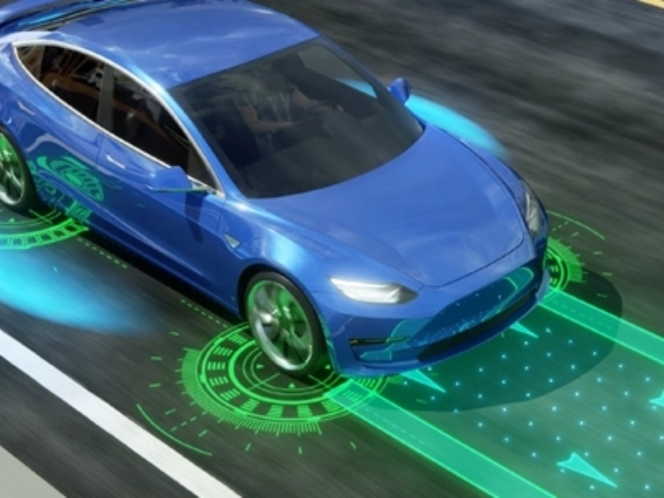
By T Murrali:
Freudenberg Performance Materials India (FPMI), part of Freudenberg Performance Materials (FPM), a global manufacturer of technical textiles, nonwovens and fibre, has been operational in India with a production site in Chennai since 1998. It has plans also to cater to the modern commercial vehicles by expanding its product portfolio.
 Globally, FPM manufactures high-performance technical textiles and nonwovens for a wide range of applications including automotive, building materials, clothing, hygiene, wearables and healthcare. The FPM products / materials for automotive industry customers include mechanically bonded nonwovens for car headliners, trunk and rear seat coverings that are characterized by abrasion resistance. Besides, it caters to the OEMs with tuft backing for carpets and moulded under-body panels and wheel liners. FPM products make driving more efficient, climate friendly and comfortable. Nonwovens are lighter than woven variants and, therefore, support a more economic driving style. They help absorb sound, ensure pleasant climate inside the vehicle and help save fuel and reduce CO2 emissions.
Globally, FPM manufactures high-performance technical textiles and nonwovens for a wide range of applications including automotive, building materials, clothing, hygiene, wearables and healthcare. The FPM products / materials for automotive industry customers include mechanically bonded nonwovens for car headliners, trunk and rear seat coverings that are characterized by abrasion resistance. Besides, it caters to the OEMs with tuft backing for carpets and moulded under-body panels and wheel liners. FPM products make driving more efficient, climate friendly and comfortable. Nonwovens are lighter than woven variants and, therefore, support a more economic driving style. They help absorb sound, ensure pleasant climate inside the vehicle and help save fuel and reduce CO2 emissions.
For some of the products FPMI is an extended arm of the manufacturing locations of FPM outside India. The global company has manufacturing facilities in Germany, Korea, China, Japan, and the US; these are the locations where it has automotive manufacturing hubs.
Speaking to this publication, G Sivasailam, Managing Director, FPMI, said, “Essentially our R&D is in Germany, Korea, China, Japan, and the US which we carry to all other consuming countries. We see the Indian market as very promising in the near future. We want to warm up the market with the services and supplies from other locations, which we are currently doing. Supplies are coming in on a duty-free basis which is used in vehicles for exports. For example, many companies are exporting quite a lot to Latin America; we cater to that by supplying headliners. We also do the sun-roof for many Japanese & Korean based car manufacturers for their export models. Currently the domestic market is catered to by a few suppliers in Mumbai and Gurugram.”
There is substantial value addition for the OEMs and end-customers with the application of non-woven products in which case cost is not a criterion. Still what is preventing the OEMs here from getting them from the global companies like Freudenberg? Sivasailam said, “We use a three-denier fibre which is very fine compared with the six-denier used in the market. So the starting point itself is totally different. Secondly, the kind of binders and latex that we use are all CFC-free and they are also bio-decomposable. At the end of the day a consumer for an entry level car will look at the price. But for the premium cars, the price may not matter much.
Speaking on the advantages he said the NVH values of this product are superior to what is available in the market but the end-consumer finds it a little isometric to the value he is getting. For instance, sound absorption by the headliner is much higher than that of one made out of six-denier but the percentage difference is not necessarily the reason for making this a premium product, the consumer is unable to comprehend the difference. With the evolution of vehicles from ICE to Electric, there are enough opportunities for companies like FPM because the noise created by the IC engine nullifies the other noises while in the EV operation is silent. Therefore, “we see a big opportunity there. That is one particular area where innovation has been directed to by Freudenberg. Not only on headliners but also on back trays, hood liners, floor mats etc. We are coming up with composites which are lighter with longer life for a carpet, offering Lutraflor (Freudenberg technology) floor mats that are lighter and stronger. They have high abrasion resistance that remains despite perpetual usage. The weight here is reduced substantially and the back trays are super absorbent of noise. The hood liners take care of the temperature as well as the noise. These are the areas where we have come up with lighter material, meeting the requirements,” he said.
These products reduce the weight of the four big mats that weigh about 3.5 to 4kg by 25 percent. Overall, there is about 10-15 percent reduction over the conventional products. That’s the reason why today a lot of patronage is shown to these products; as of now they are used only in the C or D segment cars. In India it will take a little more time to reach these segments. Customer awareness level is still not high in India. However, when it comes up, the company would be able to offer a competitive product, considering the economies of scale, which would match the market trends, he said.
UV Rays Impact
Normally, UV rays raise temperature. When they are absorbed by the seats or any component temperature builds up and the a/c in the car is made to work more to maintain the temperature. There is also fuel loss. To cut it down it is necessary to reduce the amount of UV light that goes into the car which would enhance the mileage of the vehicle; passengers also will be benefited as UV rays are not good for the skin.
FPM has developed a composite material for the under-body shield to which patent is pending. “In most countries the under-body shield is metal; we are trying to replace it with a non-woven backed composite that would have the tenacity to take stones and everything hitting it at high speed. Straightaway, the weight proposition will change,” he said. Would that not affect the safety of the vehicle since, for stability, lower centre of gravity is key and this can be achieved by placing heavier stuff under body of the car? Sivasailam said the solution is to support only on the engine side; under-body shield is normally on the engine side so that stones don’t fly into the engine and hit the other parts. When there is lighter material on the front of the vehicle it actually enhances mobility. What is unique is the way the composite is made, the technology and construction; and the amount of tenacity it brings to the product to increase longevity. It’s a 100% recyclable material as well with weight saving up to 40%.
Business Opportunities
On the new opportunities for FPM, Sivasailam said, “We are also having battery separators; they are undergoing development as high storage batteries. It avoids catching fire which mitigates the risk to a great extent because of the ceramic coating. That is where e-mobility will make big commercial success. The other possibilities for the company to explore in India are the commercial vehicles, which are now getting smarter and better as vehicle makers give importance to the interiors; so there is an opportunity for them to get into this business. Even today most accidents take place due to driver fatigue. If that can be minimised it would help. The touch on the headliner or on the seat-back, everything is important. Haptic feeling is not given importance in India as of now. That is something that will be very good with a three-denier head liner. “We are also working on better acoustic properties on the trims. We have a product called Evolon which is a fine fibre technology, spun drawn with very good NVH property. We are working with Evolon in some automotive companies where we feel it can give much superior noise control,” Sivasailam said. (MT)
LTTS Secures Multi-Year Deal From Automotive OEM For Engineering And R&D
- By MT Bureau
- January 28, 2026

Bengaluru-headquartered ER&D company L&T Technology Services (LTTS) has announced a multi-year engagement within its mobility segment from an automotive manufacturer. The agreement involves software, connectivity and digital engineering services across vehicle technology domains. This win follows the company’s investments in R&D labs and mobility infrastructure designed for programs with global manufacturers.
The engagement covers mobility engineering capabilities, including embedded systems, digital platforms, verification and validation, cloud integration and cybersecurity. LTTS intends to use its engineering expertise and delivery frameworks to support the customer's technology roadmap.
At present, LTTS operates 22 design centres and 100 innovation labs globally.
The agreement strengthens the partnership between LTTS and the automotive manufacturer in the area of mobility engineering. The company provides design, development, and testing services across the mobility, sustainability, and tech segments.
Alind Saxena, Executive Director and President, Mobility and Tech at L&T Technology Services, said, “We are proud to deepen our partnership with the valued customer through this strategic engagement. LTTS brings together domain-led engineering, secure development practices and excellence in global delivery to accelerate the future of premium mobility. The win reflects the trust placed in our teams and our commitment to delivering world-class engineering at scale”.
Valeo And NATIX Network Partner To Develop Open-Source World Foundation Model
- By MT Bureau
- January 25, 2026

French technology company Valeo and NATIX Network have announced a partnership to develop a multi-camera World Foundation Model (WFM). The project combines Valeo’s research in artificial intelligence and generative modelling with NATIX’s decentralised physical infrastructure network (DePIN) to create an open-source platform for autonomous driving and robotics.
The initiative aims to move beyond perception-based models by creating a system capable of predicting future states and reasoning about physical interactions in a four-dimensional environment. The model will be trained using NATIX’s data network, which has collected 600,000 hours of video data across the US, Europe and Asia over seven months. This data provides the multi-camera inputs necessary for the spatial perception required by autonomous vehicles and robots.
The partnership builds upon Valeo’s existing open-source frameworks, VaViM (Video Autoregressive Model) and VaVAM (Video-Action Model). While these frameworks were previously trained primarily on front-camera datasets, the integration of NATIX’s multi-camera network expands the AI’s field of vision to 360 degrees.
Under the open-source framework, the partners will release models, datasets and training tools. This approach is intended to allow the research community to fine-tune models and benchmark physical AI across various driving conditions and geographic regions. The collaboration seeks to accelerate the deployment of end-to-end AI models by learning from real-world edge cases captured by vehicles in operation.
Marc Vrecko, Chief Executive Officer, Valeo’s Brain Division, said, “Since our creation in 2018, Valeo’s AI research center has been at the forefront of AI research in the automotive industry, especially in the fields of assisted and autonomous driving. Our goal has always been to advance mobility intelligence safely and responsibly. By combining Valeo’s generative world modeling research expertise with NATIX’s global multi-camera data, we are accelerating both the quality and the accessibility of next-generation end-to-end AI models, enabling the research community to build upon strong open models.”
Alireza Ghods, CEO and Co-Founder, NATIX, added, “WFMs are a once-in-a-generation opportunity — similar to the rise of LLMs in 2017–2020. The teams that build the first scalable world models will define the foundation of the next AI wave: Physical AIs. With our distributed multi-camera network, NATIX has a clear advantage of being able to move faster than large OEMs.”
- Tata Technologies
- Amazon Web Services
- InnoVent 2026
- Jaguar Land Rover
- Air India
- ES-Tec Group
- Warren Harris
Tata Technologies Concludes InnoVent 2026 Engineering Hackathon
- By MT Bureau
- January 23, 2026

Tata Technologies has announced the completion of the 3rd edition of its innovation hackathon, InnoVent 2026, supported by Amazon Web Services (AWS). The initiative invited engineering students to develop solutions for mobility challenges in the automotive and manufacturing sectors. The programme received participation from 10,247 students across 404 colleges in India, resulting in 2,822 projects.
The competition focused on the theme of intelligence-driven mobility for the year 2030. Participants received over 650 hours of mentoring and training from subject matter experts to convert their concepts into prototypes. The top 10 teams presented their work at the company's Hinjewadi campus in Pune before a jury of industry leaders from Jaguar Land Rover, Air India and ES-Tec Group.
Team Drushti from CMR College of Engineering & Technology, Hyderabad, secured the first prize of INR 300,000 for a system that customises vehicle infotainment for visually impaired drivers. Second place went to Team The T-Factor from Vellore Institute of Technology, Chennai, for an AI-based breakdown prevention system. Team SwarmSync from the International Institute of Information Technology (I²IT), Pune, took third place for an intelligent fleet management solution using V2X communication.
Tata Technologies offered career opportunities to all 42 finalists involved in the top projects. Furthermore, all participants were granted one-year access to the iGETIT learning platform to study emerging technologies. The finalist projects covered areas such as blockchain for vehicle security, wireless charging for electric vehicles, and AI-led battery monitoring.
The event featured a humanoid robot that performed roles such as coordinating panel discussions and interacting with attendees. A panel of industry experts discussed the global demand for engineering talent and the impact of technology on future mobility.
Warren Harris, MD & CEO, Tata Technologies, said, "InnoVent at Tata Technologies represents our conviction that the future is shaped by those who combine engineering excellence with human purpose to engineer a better world".
Kia India Reintroduces Driver Behaviour Monitoring Tech
- By MT Bureau
- January 23, 2026

Kia India has announced the re-launch of its Kia Inspiring Drive (K.I.D) Program, debuting alongside the New Kia Seltos. The initiative is a driving score system designed to monitor real-time behaviour and provide insights into habits. Accessed via the Kia Connect app, the programme will be rolled out across the company’s connected vehicle portfolio in phases.
The K.I.D score is calculated using a three-month rolling average based on parameters including rapid acceleration, rapid deceleration and sudden starts. To ensure data accuracy, the system applies a weighted value based on the specific vehicle. This methodology aims to reflect long-term driving patterns rather than isolated incidents.
The programme incorporates community-based leaderboards, allowing owners to compare scores and track their standing within the Kia community. By turning road safety into an interactive experience, the manufacturer intends to encourage responsible driving through recognition and competition.
The behaviour-based scoring system provides data to help users understand the impact of their habits on road safety. Kia is supporting the re-launch with a digital and press campaign to increase awareness among its customer base.
Atul Sood, Senior Vice-President – Marketing & Sales, Kia India, said, “Safety remains at the core of Kia’s philosophy, and with the re-launch of the Kia Inspiring Drive program alongside the New Seltos, we are taking another meaningful step towards encouraging responsible driving behaviour. By offering customers clear, data-driven insights into their driving patterns, the KID program empowers them to make safer choices on the road, while also enhancing their overall ownership experience.”







Comments (0)
ADD COMMENT